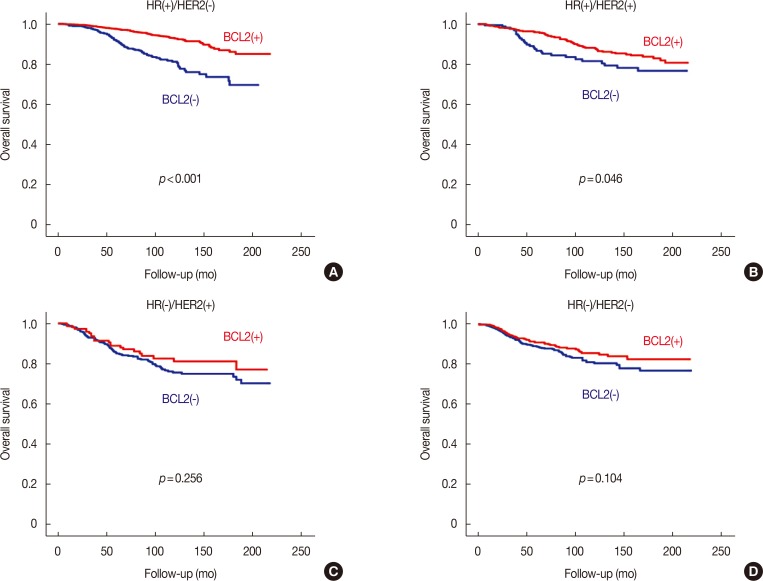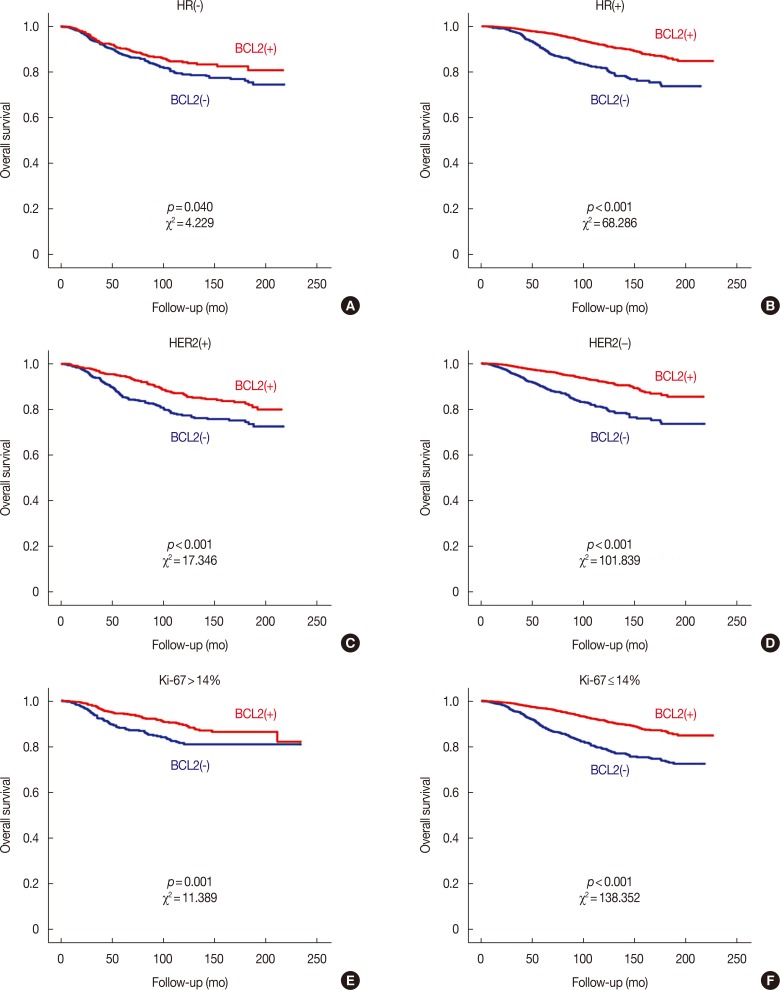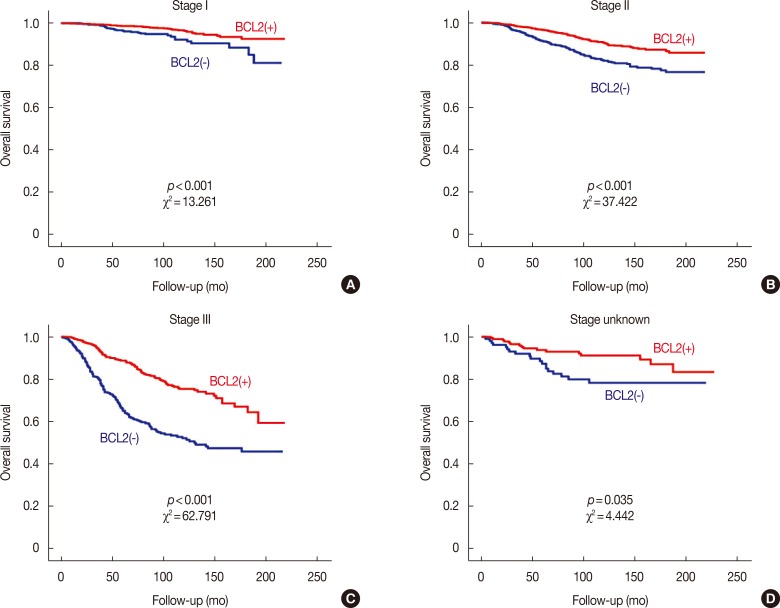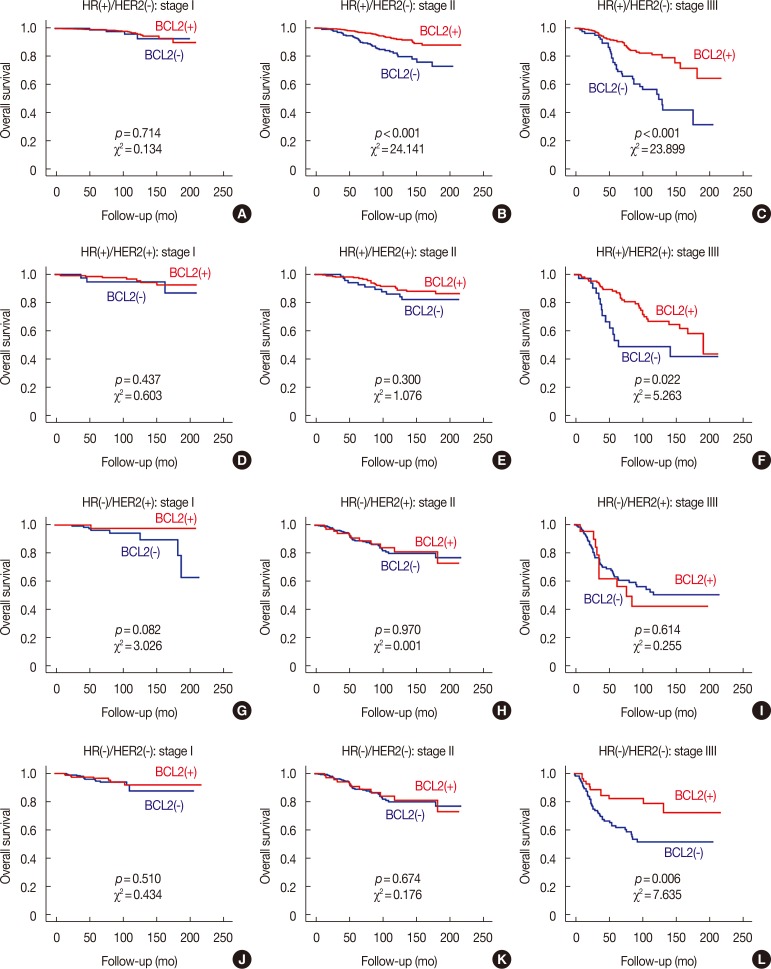J Breast Cancer.
2017 Mar;20(1):54-64. 10.4048/jbc.2017.20.1.54.
Prognostic Influence of BCL2 on Molecular Subtypes of Breast Cancer
- Affiliations
-
- 1Department of Surgery, Seoul National University Boramae Medical Center, Seoul, Korea. kiterius@snu.ac.kr
- 2Department of Surgery, Seoul National University College of Medicine, Seoul, Korea.
- 3Department of Biostatistics, Seoul National University Boramae Medical Center, Seoul, Korea.
- 4College of Pharmacy, Sookmyung Women's University, Seoul, Korea.
- 5Department of Pathology, Seoul National University Boramae Medical Center, Seoul, Korea.
- KMID: 2379399
- DOI: http://doi.org/10.4048/jbc.2017.20.1.54
Abstract
- PURPOSE
We aimed to reveal the prognostic influence of B-cell CLL/lymphoma 2 (BCL2) on molecular subtypes of breast cancer.
METHODS
We analyzed 9,468 patients with primary breast cancer. We classified molecular subtypes according to the National Comprehensive Cancer Network (NCCN) and St. Gallen guidelines, mainly on the basis of the expression of hormonal receptor (HR), human epidermal growth factor receptor 2 (HER2), and Ki-67.
RESULTS
Regarding NCCN classification, BCL2 was a strong favorable prognostic factor in the HR(+)/HER2(-) subtype (p<0.001) and a marginally significant favorable prognosticator in the HR(+)/HER2(+) subtype (p=0.046). BCL2 had no prognostic impact on HR(-)/HER2(+) and HR(-)/HER2(-) subtypes. In relation to St. Gallen classification, BCL2 was a strong favorable prognosticator in luminal A and luminal B/HER2(-) subtypes (both p<0.001). BCL2 was a marginally significant prognosticator in the luminal B/HER2(+) subtype (p=0.046), and it was not a significant prognosticator in HER2 or triple negative (TN) subtypes. The prognostic effect of BCL2 was proportional to the stage of breast cancer in HR(+)/HER2(-), HR(+)/HER2(+), and HR(-)/HER2(-) subtypes, but not in HR(-)/HER2(+) subtype. BCL2 was not a prognostic factor in TN breast cancer regardless of epidermal growth factor receptor expression.
CONCLUSION
The prognostic influence of BCL2 was different across molecular subtypes of breast cancer, and it was largely dependent on HR, HER2, Ki-67, and the stage of cancer. BCL2 had a strong favorable prognostic impact only in HR(+)/HER2(-) or luminal A and luminal B/HER2(-) subtypes, particularly in advanced stages. Further investigations are needed to verify the prognostic influence of BCL2 on molecular subtypes of breast cancer and to develop clinical applications for prognostication using BCL2.
MeSH Terms
Figure
Cited by 2 articles
-
ABT-737 ameliorates docetaxel resistance in triple negative breast cancer cell line
Eunjoo Hwang, Seong-Hye Hwang, Jongjin Kim, Jin Hyun Park, Sohee Oh, Young A Kim, Ki-Tae Hwang
Ann Surg Treat Res. 2018;95(5):240-248. doi: 10.4174/astr.2018.95.5.240.BCL2 Regulation according to Molecular Subtype of Breast Cancer by Analysis of The Cancer Genome Atlas Database
Ki-Tae Hwang, Kwangsoo Kim, Ji Hyun Chang, Sohee Oh, Young A Kim, Jong Yoon Lee, Se Hee Jung, In Sil Choi
Cancer Res Treat. 2018;50(3):658-669. doi: 10.4143/crt.2017.134.
Reference
-
1. BCL2, apoptosis regulator. National Center for Biotechnology Information. Accessed February 8th, 2017. http://www.ncbi.nlm.nih.gov/gene/596.2. Siddiqui WA, Ahad A, Ahsan H. The mystery of BCL2 family: Bcl-2 proteins and apoptosis: an update. Arch Toxicol. 2015; 89:289–317. PMID: 25618543.
Article3. Tsujimoto Y, Finger LR, Yunis J, Nowell PC, Croce CM. Cloning of the chromosome breakpoint of neoplastic B cells with the t(14;18) chromosome translocation. Science. 1984; 226:1097–1099. PMID: 6093263.
Article4. Tzifi F, Economopoulou C, Gourgiotis D, Ardavanis A, Papageorgiou S, Scorilas A. The role of BCL2 family of apoptosis regulator proteins in acute and chronic leukemias. Adv Hematol. 2012; 2012:524308. PMID: 21941553.
Article5. Martin B, Paesmans M, Berghmans T, Branle F, Ghisdal L, Mascaux C, et al. Role of Bcl-2 as a prognostic factor for survival in lung cancer: a systematic review of the literature with meta-analysis. Br J Cancer. 2003; 89:55–64. PMID: 12838300.
Article6. Zhao L, Yu N, Guo T, Hou Y, Zeng Z, Yang X, et al. Tissue biomarkers for prognosis of prostate cancer: a systematic review and meta-analysis. Cancer Epidemiol Biomarkers Prev. 2014; 23:1047–1054. PMID: 24636974.
Article7. Cheng H, Wang X, Li T, Chen L. Bcl-2 expression and patient survival in gastric cancer: a systematic review of the literature with meta-analysis. Med Oncol. 2015; 32:389. PMID: 25428392.
Article8. Bold RJ, Hess KR, Pearson AS, Grau AM, Sinicrope FA, Jennings M, et al. Prognostic factors in resectable pancreatic cancer: p53 and bcl-2. J Gastrointest Surg. 1999; 3:263–277. PMID: 10481119.
Article9. Leek RD, Kaklamanis L, Pezzella F, Gatter KC, Harris AL. bcl-2 in normal human breast and carcinoma, association with oestrogen receptor-positive, epidermal growth factor receptor-negative tumours and in situ cancer. Br J Cancer. 1994; 69:135–139. PMID: 8286195.
Article10. Silvestrini R, Veneroni S, Daidone MG, Benini E, Boracchi P, Mezzetti M, et al. The Bcl-2 protein: a prognostic indicator strongly related to p53 protein in lymph node-negative breast cancer patients. J Natl Cancer Inst. 1994; 86:499–504. PMID: 8133533.
Article11. Joensuu H, Pylkkänen L, Toikkanen S. Bcl-2 protein expression and long-term survival in breast cancer. Am J Pathol. 1994; 145:1191–1198. PMID: 7977649.12. Callagy GM, Pharoah PD, Pinder SE, Hsu FD, Nielsen TO, Ragaz J, et al. Bcl-2 is a prognostic marker in breast cancer independently of the Nottingham Prognostic Index. Clin Cancer Res. 2006; 12:2468–2475. PMID: 16638854.
Article13. Berardo MD, Elledge RM, de Moor C, Clark GM, Osborne CK, Allred DC. bcl-2 and apoptosis in lymph node positive breast carcinoma. Cancer. 1998; 82:1296–1302. PMID: 9529021.
Article14. Ali HR, Dawson SJ, Blows FM, Provenzano E, Leung S, Nielsen T, et al. A Ki67/BCL2 index based on immunohistochemistry is highly prognostic in ER-positive breast cancer. J Pathol. 2012; 226:97–107. PMID: 21953021.
Article15. Callagy GM, Webber MJ, Pharoah PD, Caldas C. Meta-analysis confirms BCL2 is an independent prognostic marker in breast cancer. BMC Cancer. 2008; 8:153. PMID: 18510726.
Article16. Dawson SJ, Makretsov N, Blows FM, Driver KE, Provenzano E, Le Quesne J, et al. BCL2 in breast cancer: a favourable prognostic marker across molecular subtypes and independent of adjuvant therapy received. Br J Cancer. 2010; 103:668–675. PMID: 20664598.
Article17. Hwang KT, Woo JW, Shin HC, Kim HS, Ahn SK, Moon HG, et al. Prognostic influence of BCL2 expression in breast cancer. Int J Cancer. 2012; 131:E1109–E1119. PMID: 22418857.
Article18. Hammond ME, Hayes DF, Dowsett M, Allred DC, Hagerty KL, Badve S, et al. American Society of Clinical Oncology/College of American Pathologists guideline recommendations for immunohistochemical testing of estrogen and progesterone receptors in breast cancer. J Clin Oncol. 2010; 28:2784–2795. PMID: 20404251.
Article19. Wolff AC, Hammond ME, Hicks DG, Dowsett M, McShane LM, Allison KH, et al. Recommendations for human epidermal growth factor receptor 2 testing in breast cancer: American Society of Clinical Oncology/College of American Pathologists clinical practice guideline update. J Clin Oncol. 2013; 31:3997–4013. PMID: 24101045.
Article20. National Comprehensive Cancer Network. Clinical practice guildlines-v.1. 2016. Accessed February 8th, 2017. https://www.nccn.org/professionals/physician_gls/pdf/breast.pdf.21. Goldhirsch A, Wood WC, Coates AS, Gelber RD, Thürlimann B, Senn HJ, et al. Strategies for subtypes-dealing with the diversity of breast cancer: highlights of the St. Gallen International Expert Consensus on the Primary Therapy of Early Breast Cancer 2011. Ann Oncol. 2011; 22:1736–1747. PMID: 21709140.
Article22. Goldhirsch A, Winer EP, Coates AS, Gelber RD, Piccart-Gebhart M, Thürlimann B, et al. Personalizing the treatment of women with early breast cancer: highlights of the St Gallen International Expert Consensus on the primary therapy of early breast cancer 2013. Ann Oncol. 2013; 24:2206–2223. PMID: 23917950.23. Coates AS, Winer EP, Goldhirsch A, Gelber RD, Gnant M, Piccart-Gebhart M, et al. Tailoring therapies-improving the management of early breast cancer: St Gallen International Expert Consensus on the primary therapy of early breast cancer 2015. Ann Oncol. 2015; 26:1533–1546. PMID: 25939896.
Article24. Seong MK, Lee JY, Byeon J, Sohn YJ, Seol H, Lee JK, et al. Bcl-2 is a highly significant prognostic marker of hormone-receptor-positive, human epidermal growth factor receptor-2-negative breast cancer. Breast Cancer Res Treat. 2015; 150:141–148. PMID: 25682076.
Article25. Eom YH, Kim HS, Lee A, Song BJ, Chae BJ. BCL2 as a subtype-specific prognostic marker for breast cancer. J Breast Cancer. 2016; 19:252–260. PMID: 27721874.
Article26. Chen LY, Tsang JY, Ni YB, Chan SK, Chan KF, Zhang S, et al. Bcl2 and Ki67 refine prognostication in luminal breast cancers. Breast Cancer Res Treat. 2015; 149:631–643. PMID: 25648135.
Article27. Abdel-Fatah TM, Perry C, Dickinson P, Ball G, Moseley P, Madhusudan S, et al. Bcl2 is an independent prognostic marker of triple negative breast cancer (TNBC) and predicts response to anthracycline combination (ATC) chemotherapy (CT) in adjuvant and neoadjuvant settings. Ann Oncol. 2013; 24:2801–2807. PMID: 23908177.
Article28. Bouchalova K, Kharaishvili G, Bouchal J, Vrbkova J, Megova M, Hlobilkova A. Triple negative breast cancer-BCL2 in prognosis and prediction: review. Curr Drug Targets. 2014; 15:1166–1175. PMID: 25374001.
- Full Text Links
- Actions
-
Cited
- CITED
-
- Close
- Share
- Similar articles
-
- Prognostic influences of B-cell lymphoma 2–positive expression on late recurrence in breast cancer
- BCL2 as a Subtype-Specific Prognostic Marker for Breast Cancer
- The different prognostic impact of age according to individual molecular subtypes in breast cancer
- Imaging features of breast cancer molecular subtypes: state of the art
- BCL2 Regulation according to Molecular Subtype of Breast Cancer by Analysis of The Cancer Genome Atlas Database





